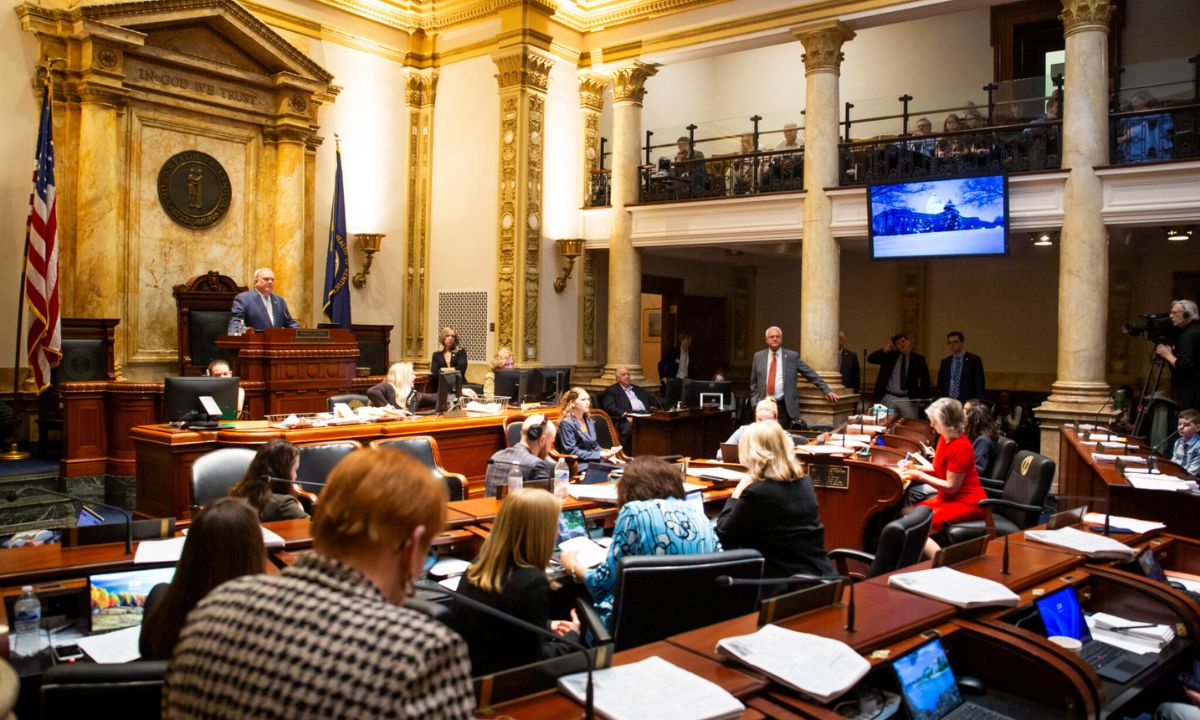Amendment Allowing Public Funds for Nonpublic Kentucky Schools Goes to Voters
Ballot measure will decide whether to lift the constitutional ban that led to courts striking down charter schools and tax credit legislation.

Get stories like this delivered straight to your inbox. Sign up for The 74 Newsletter
FRANKFORT — The Kentucky Senate on Friday joined the House in passing legislation for a constitutional amendment — called a “game changer” by one Republican supporter — that would allow public dollars to fund nonpublic schools.
In a vote of 27-8, senators approved House Bill 2. Eastern Kentucky Republican Sens. Brandon Storm and Phillip Wheeler joined six of the seven Senate Democrats in opposing the bill. Democrat Robin Webb did not cast a vote, nor did Republicans Jared Carpenter and Brandon Smith.
Because the bill would amend the Kentucky Constitution, voters will decide the proposal’s fate in November. Democratic Gov. Andy Beshear, who has opposed giving public dollars to nonpublic schools, will not be officially weighing in because constitutional amendments are not subject to gubernatorial veto.
The Senate Education Committee chairman, Sen. Stephen West, R-Paris, said the bill could pave the way to offering “school choice” to Kentuckians. During the House’s debate, Speaker David Osborne admonished members for speaking about possible future legislation stemming from the amendment, rather than the bill before them.
West said the constitutional amendment is an attempt to “modernize” the state’s education system.
“This is a game changer,” West said. “This will dictate where we are 25 years from now.”
The bill’s primary sponsor, House Republican Caucus Chair Suzanne Miles, of Owensboro, has said the bill would “let the voters decide” if the General Assembly should have the option of funding education outside the “system of common schools,” an option not allowed by the Constitution adopted in 1891.
In the Senate, Republican leaders backed the bill. Senate President Pro Tem David Givens, of Greensburg, argued that it’s not new for public dollars to go to private entities. He pointed to contractors who build roads.
“If I had the list of vendors for which we send public funds to private entities, I can certainly more than fill my 10 minutes, Mr. President, reading that list of vendors,” Givens said.
Majority Floor Leader Sen. Damon Thayer, of Georgetown, urged Democrats to visit blue cities across the country in states like New York and California.
“The minority party and the education establishment here in Kentucky continue to protect the status quo despite the shift that is happening nationwide in blue cities and blue states in favor of more and more ‘school choice,’” Thayer said.
Like their House counterparts, Senate Democrats raised concerns about the bill being fast-tracked through the General Assembly this week. Democratic Caucus Chair Reggie Thomas, of Lexington, called it a “flawed approach” to doing the public’s business on a bill of such importance. The Senate Education Committee forwarded the bill in a special-called Thursday meeting. The House gave its approval Wednesday despite bipartisan opposition.
West pushed back on Thomas’ point, saying the bill is two-pages long and has been made public since January.
Sen. Cassie Chambers Armstrong, D-Louisville, admonished the proposed amendment for “notwithstanding,” or suspending, seven sections of the 1891 Constitution.
“I worry Mr. President, that we are so desperate to pass this amendment and give money to private schools to take it away from our public schools that we are risking shredding the Kentucky Constitution to make that happen,” she said.
Kentucky’s Constitution strictly bars using tax dollars to fund any but the state’s “common schools” (or public schools), and courts citing the Constitution have struck down legislative attempts to steer tax dollars into private or charter schools.
Courts have struck down the General Assembly’s charter school legislation. In December, Franklin Circuit Court Judge Phillip Shepherd wrote that charter schools are “private entities” that do not meet the Kentucky Constitution’s definition of “public schools” or “common schools.”
The Kentucky Supreme Court unanimously struck down a Kentucky law in December 2022 creating a generous tax credit to help families pay for tuition at private schools. The opinion, which upheld a circuit court ruling by Shepherd, cited a long line of precedent reinforcing the Kentucky Constitution’s ban on the state financially supporting private schools.
Democratic Floor Leader Sen. Gerald Neal, of Louisville, said Kentucky’s existing public schools are already “simply underfunded” and should be prioritized. The General Assembly has yet to finalize the next two-year state budget.
“I think we have the capacity to do it,” Neal said. “The question is, do we have the will? Do we have the commitment? Do we have the wisdom to do it?”
Kentucky Lantern is part of States Newsroom, a nonprofit news network supported by grants and a coalition of donors as a 501c(3) public charity. Kentucky Lantern maintains editorial independence. Contact Editor Jamie Lucke for questions: [email protected]. Follow Kentucky Lantern on Facebook and Twitter.
Get stories like these delivered straight to your inbox. Sign up for The 74 Newsletter

;)